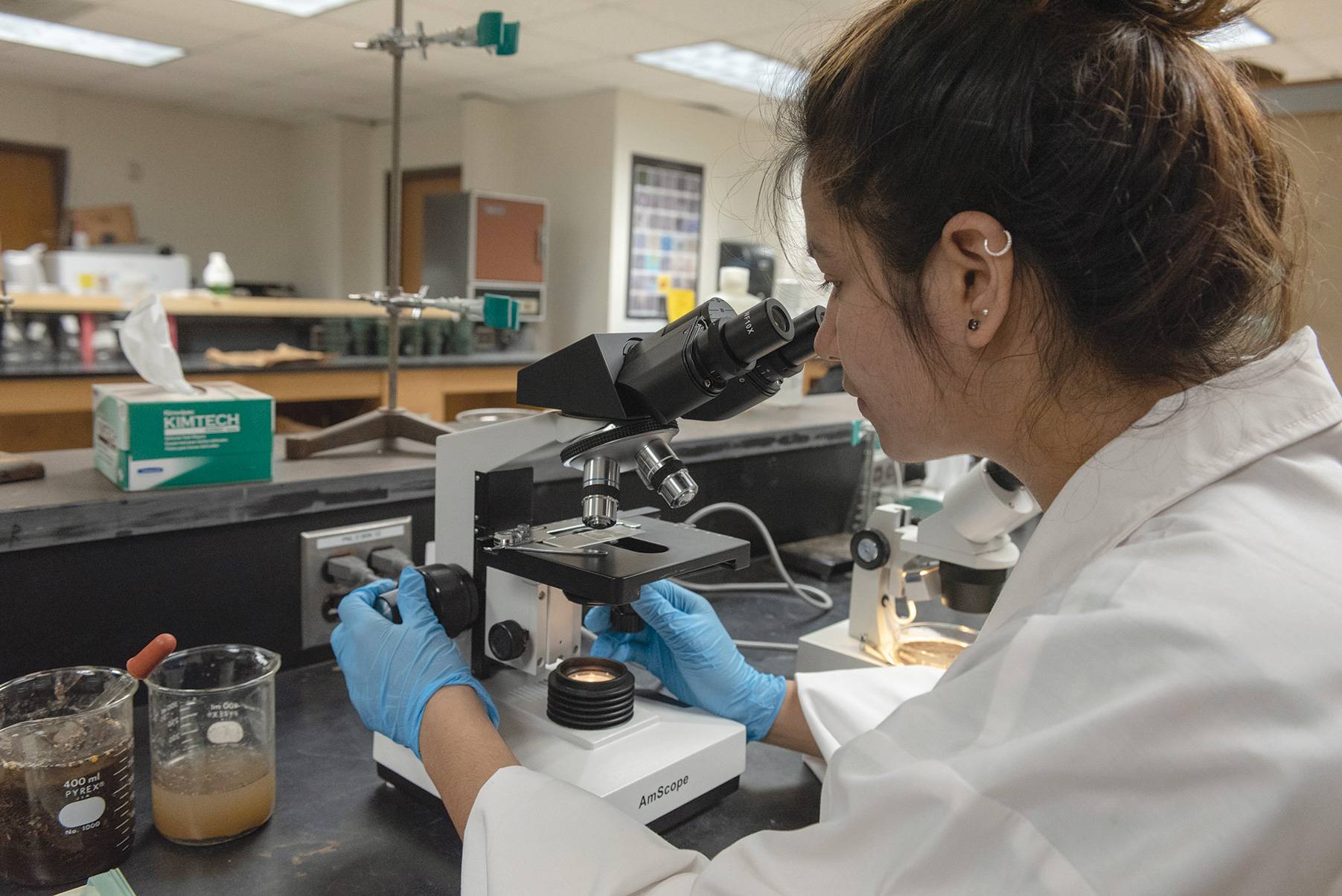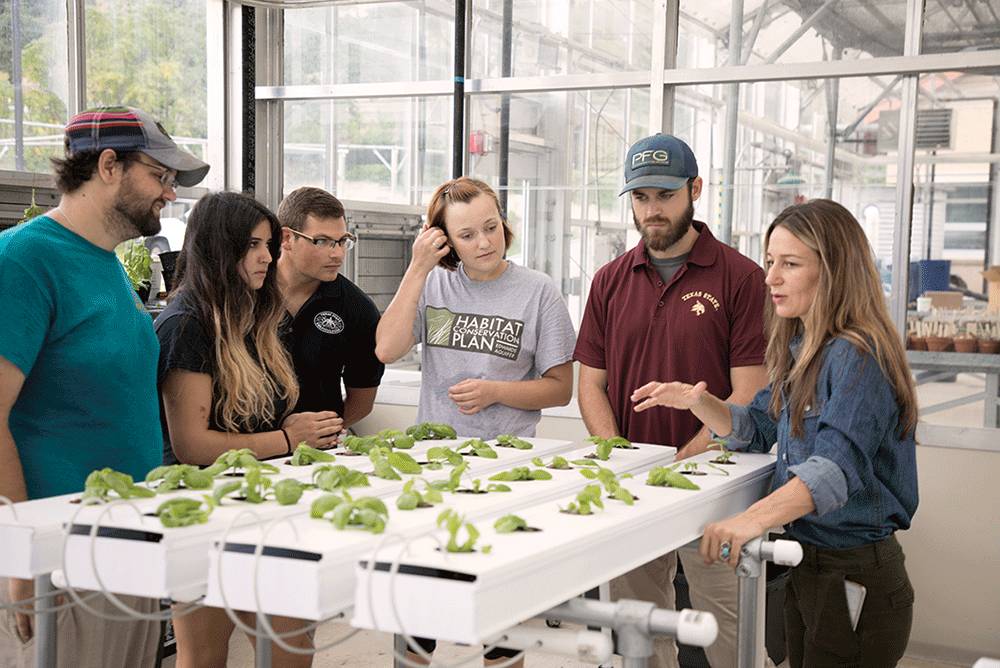Integrated Agricultural Sciences (M.S.)
M.S. Integrated Agricultural Sciences

Program Overview
By integrating animal science, plant and soil science, agricultural economics, and agricultural education into one program, students experience a transdisciplinary approach to research and education concerning land use strategies, crop and animal production, distribution, sales, economics, policy, and the environment.
Course Work
The program requires completion of 36 semester credit hours for thesis and professional students. Courses include statistics, agricultural development and policy, research methods, agroecology, foundations of ethics and leadership in agriculture, and the role of animal science in society. In addition to core classes, students will choose courses in four focused research areas: agricultural business; economics and policy; agricultural education; animal science; and crop and soil science. Students will also take courses in a variety of departments such as biology, geography, engineering technology, and others. Instruction is delivered on the San Marcos Campus.
| Degree | Hours | Research Option | Minor Option | Location |
|---|---|---|---|---|
Degree M.S. | Hours 36 | Research Option Professional Option | Minor Option No minor | Location San Marcos |
Degree M.S. | Hours 36 | Research Option Thesis | Minor Option No minor | Location San Marcos |
Program Details
Research conducted by graduate students will be connected to real-world agricultural issues, as well as recommendations from our industry advisory committee and stakeholders, including small farmers and ranchers.
Program Mission
The Department of Agricultural Sciences provides an enriched learning environment for a diverse body of graduate students and prepares them for careers in agriculture-related fields at the state, national and international levels. The department conducts multidisciplinary research and provides services that enhance the livelihood of farming communities and improve food security.
Career Options
|
|
Program Faculty
Faculty specialize in:
|
|
Contact us for general questions about your application, funding opportunities, and more. If you have specific questions after reviewing the program details, contact the program's graduate advisor.
Graduate Advisor
Dr. Pratheesh Sudhakaran
pos6@txstate.edu
512.245.2459
Agriculture (AG), Room 304

Apply Now Already know that Texas State is right for you?
Application Deadlines
| Deadlines | U.S. Citizen | International |
|---|---|---|
Deadlines Fall - Priority | U.S. Citizen February 1 | International February 1 |
Deadlines Fall - Standard | U.S. Citizen June 15 (*Flexible) | International June 1 |
Deadlines Spring | U.S. Citizen October 15 (*Flexible) | International October 1 |
Deadlines Summer I | U.S. Citizen April 15 (*Flexible) | International March 15 |
Deadlines Summer II | U.S. Citizen June 1 (*Flexible) | International No Admission |
*This program’s deadline is flexible for those not requiring an F/J visa. A flexible deadline means applications received after the standard deadline may be reviewed on a first-come, first-served basis with no guarantees for admission consideration.
|
|
Funding Information If you are applying for an assistantship in the fall term, send the application letter, statement of reasons for graduate study, and two reference letters directly to the graduate advisor in the Department of Agricultural Sciences by March 31. If you are seeking an assistantship for terms other than fall, awards will be made if funds are available. The awards are based on scholastic achievement. |
|
|
Decision Timeline This program reviews applications on a rolling basis. |
Admission Requirements
The items required for admission consideration are listed below. Additional information for applicants with international credentials can be found on our international web pages.
-
Application
- Completed online application
Review important information about the online application.
-
Application Fee
- $55 Nonrefundable application fee, OR
- $90 Nonrefundable application fee for applications with international credentials
Review important information about application fees.
-
Transcripts & GPA
- baccalaureate degree in agriculture, biology, chemistry, economics, education, or a closely related field demonstrating adequate preparation from a regionally accredited university. The degree earned should indicate the ability to conduct and complete the thesis research proposed or the professional option with excellent results. (Non-U.S. degrees must be equivalent to a four-year U.S. Bachelor’s degree. In most cases, three-year degrees are not considered. Visit our International FAQs for more information.)
- a copy of an official transcript from each institution where course credit was granted
- a 3.0 overall GPA or a 3.0 GPA in your last 60 hours of undergraduate course work (plus any completed graduate courses)
Review important information about transcripts. Official transcripts, sent directly from your institution, will be required if admission is granted.
-
Test Scores
GRE
- GRE not required
Approved English Proficiency Exam Scores
Applicants are required to submit an official English proficiency exam score that meets the minimum program requirements below unless they have earned a bachelor’s degree or higher from a regionally accredited U.S. institution or the equivalent from a country on our exempt countries list.
- official TOEFL iBT scores required with a 78 overall and minimum individual module scores of
- 19 listening
- 19 reading
- 19 speaking
- 18 writing
- official PTE scores required with a 52 overall
- official IELTS (academic) scores required with a 6.5 overall and
- minimum individual module scores of 6.0
- official Duolingo scores required with a 110 overall
- official TOEFL Essentials scores required with an 8.5 overall
This program does not offer admission if the scores above are not met.
Review important information about official test scores.
-
Documents
Documents
- resume/CV detailing prior work experience, research experience, awards, scholarships, and other related qualifications
- statement of interest (two-page maximum) including research interests, plans for graduate study, and professional aspirations and describing how your scholarly interests and relevant skills can be utilized in the program to pursue those goals
- three letters of recommendation from non-related individuals familiar with your scholarly work and/or relevant work experience
Review important information about documents.